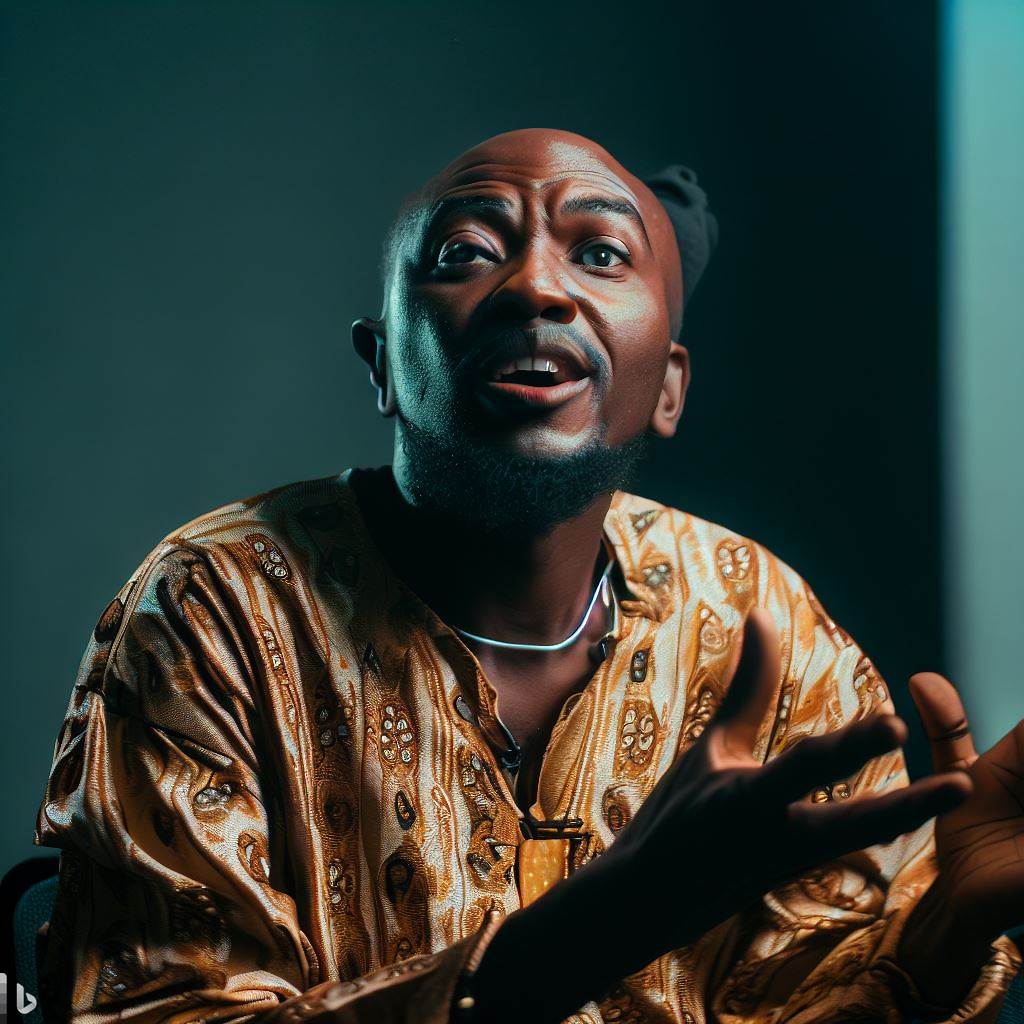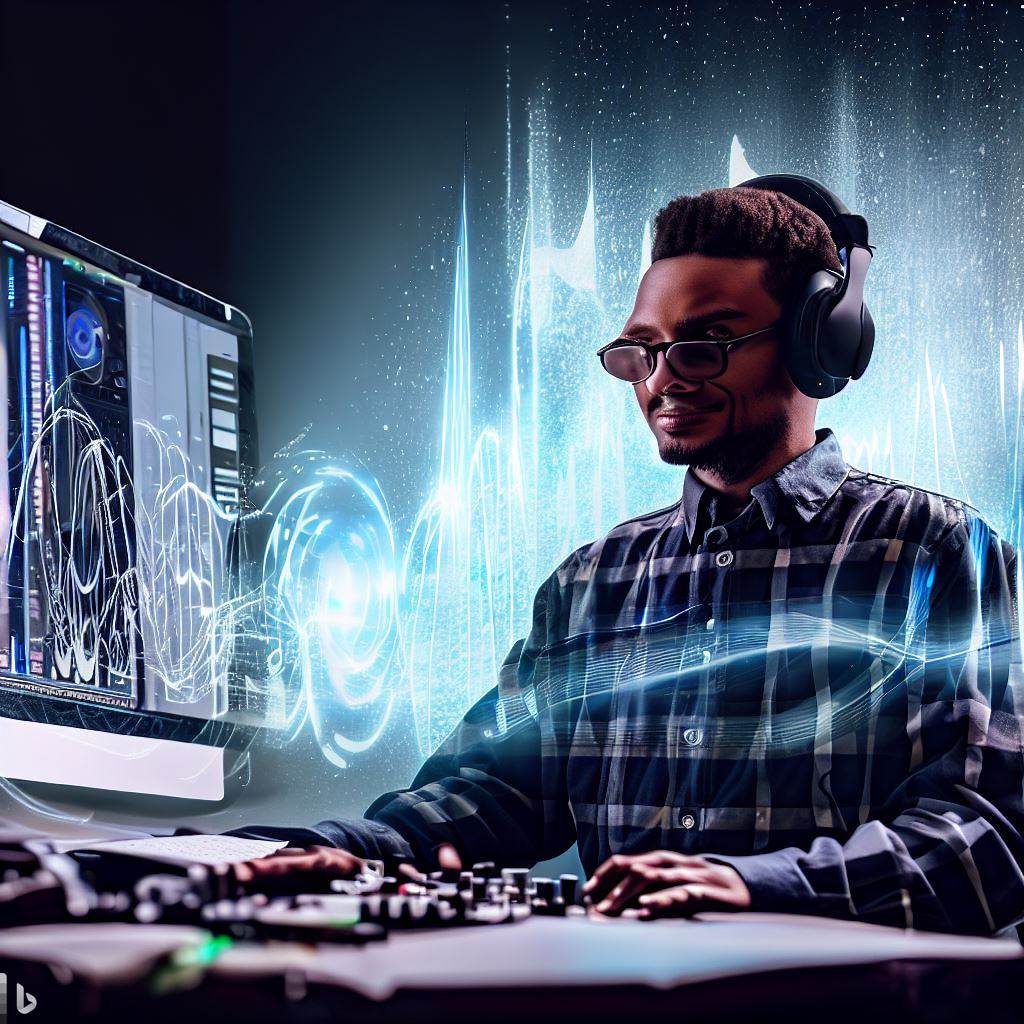Introduction
“How Sound Effects Shape Nigerian Film Narratives” highlights Nollywood, Nigeria’s film industry powerhouse, commanding global cinema recognition.
With an annual output of over 2,500 films, Nollywood has become the second-largest film industry in the world.
This rapid growth can be attributed to various factors, including the effective use of sound effects in film narratives.
Sound effects play a vital role in shaping Nigerian films by complementing the visual elements and immersing the audience in the story.
They enhance the storytelling by adding depth, emotion, and suspense to the scenes.
For example, the sound of footsteps approaching in a horror film builds tension and anticipation, intensifying the audience’s fear.
In addition to enhancing storytelling, sound effects also create immersive experiences for the audience.
They transport the viewers into the world of the film, making them feel like active participants.
The realistic sounds of nature, bustling marketplaces, or chaotic city streets immerse the audience and make the film more relatable and believable.
Furthermore, sound effects in Nigerian films contribute to the cultural authenticity and identity of the narratives.
They incorporate traditional Nigerian music, instruments, and everyday sounds, giving the films a distinct Nigerian flavor.
This cultural resonance not only appeals to the local audience but also resonates with viewers around the world, fostering a sense of connection and appreciation for Nigerian storytelling.
In fact, sound effects play a crucial role in shaping Nigerian film narratives.
By enhancing storytelling and creating immersive experiences, they captivate the audience and bring the films to life.
The effective use of sound effects in Nollywood has contributed to its success and global recognition, making it a force to be reckoned with in the film industry.
Historical Context of Nigerian Film Industry
Evolution of Nigerian cinema from Nollywood’s inception
Nigeria’s film industry has undergone a remarkable transformation since the birth of Nollywood.
In the early days of Nollywood, Nigerian filmmakers faced numerous challenges, such as limited finances and equipment.
However, despite these obstacles, Nollywood slowly evolved into a thriving industry, shaping the country’s cultural landscape.
Growth and international recognition of Nollywood industry
As the industry grew, the Nigerian film industry gained recognition not only locally but also internationally.
Nollywood movies began to gain popularity and receive critical acclaim at film festivals around the world.
One essential aspect that contributed to Nollywood’s rise to prominence was the effective use of sound effects.
Importance of sound effects in Nigerian films’ rise to popularity
Sound effects play a crucial role in enhancing the narrative and creating an immersive experience for the audience.
- In Nigerian films, sound effects are employed to amplify emotions, build tension, and create realistic environments.
- By incorporating well-executed sound effects, Nigerian filmmakers were able to captivate the audience and tell their stories more effectively.
- The use of sound effects became a distinguishing characteristic of Nigerian films, setting them apart from other cinema industries.
- Furthermore, sound effects played a vital role in overcoming the limitations of low-budget productions.
- With limited resources, Nigerian filmmakers relied on creative sound design to make their films more engaging.
- By skillfully incorporating sound effects, filmmakers were able to compensate for the lack of high-quality visuals or expensive special effects.
- For example, in action scenes, the sound of gunshots and explosions can create a sense of excitement and intensity.
- In horror films, eerie and suspenseful sound effects heighten the fear factor and enhance the overall viewing experience.
- Sound effects also contribute to the portrayal of cultural and social contexts in Nigerian films.
- The use of traditional music, local dialects, and natural sounds helps to create an authentic representation of Nigerian culture.
- By immersing the audience in the sounds of Nigeria, filmmakers strengthen the connection between the viewers and the story.
In short, the historical context of the Nigerian film industry reveals the significant role sound effects played in shaping Nigerian film narratives.
From its humble beginnings, Nollywood has grown into a globally recognized industry.
The use of sound effects in Nigerian films has been instrumental in capturing and captivating audiences, despite resource constraints.
As the industry continues to evolve, sound effects will undoubtedly remain a vital element in Nigerian cinema, adding depth and enhancing storytelling.
Read: Training Institutes for Sound Editors in Nigeria
The Role of Sound Effects in Nigerian Film Narratives
In Nigerian film narratives, sound effects play a crucial role in shaping the overall cinematic experience for the audience.
Beyond visuals, soundscapes contribute significantly to the immersion and storytelling techniques used in these films.
Setting the Scene
Setting the scene is one of the primary functions of sound effects in Nigerian films.
By creating a realistic audio environment, sound designers bring the audience directly into the world the film presents.
The use of ambient sounds, such as birds chirping or traffic noise, immerses viewers in a familiar atmosphere, making the story feel more grounded and believable.
Additionally, the strategic inclusion of specific sounds can establish the time and place of the narrative.
For example, the sound of a traditional instrument can signify a historical period or a particular region in Nigeria.
Enhancing Emotions and Atmosphere
Another way sound effects enhance Nigerian film narratives is by evoking specific emotions and atmosphere. Music plays a crucial role in this aspect.
With carefully selected tracks, filmmakers can elicit feelings of joy, sadness, romance, or tension, effectively enhancing the audience’s emotional response to the story.
Incorporating sound effects like music or eerie noises heightens suspense, fear, and excitement, enriching cinematic experiences.
Character Development
Sound effects also contribute to character development in Nigerian films.
By utilizing specific sounds that reflect characters’ personality and actions, filmmakers can immerse the audience deeper into the story.
For instance, the sound of footsteps can highlight a character’s confidence or uncertainty, while the sound of a specific object being manipulated can imply their expertise or lack thereof.
Voice enhancements like echoes or pitch alterations add character depth, making them memorable and engaging for viewers.
Pacing and Rhythm
Pacing and rhythm are crucial elements in any film, and sound effects serve as valuable tools to maintain the momentum in Nigerian narratives.
By utilizing sound effects strategically, filmmakers can guide the audience through various scenes, ensuring that the film flows smoothly and engagingly.
The use of tempo-changing music or intensifying sound effects during action sequences helps build excitement and keeps viewers invested in the story.
On the other hand, well-timed moments of silence can create impactful pauses or contrasts, allowing for emotional impact or emphasizing specific narrative beats.
In essence, sound effects are integral to shaping Nigerian film narratives.
From setting the scene to enhancing emotions and atmosphere, they contribute significantly to the overall cinematic experience.
Moreover, sound effects aid character development and pacing, enriching the storytelling techniques employed in these films.
Attending to sound design details, Nigerian filmmakers craft immersive, captivating narratives that define the distinct identity of their cinema.
Read: Legal Considerations for Nigerian Sound Editors
Notable Examples of Sound Effects in Nigerian Films
Case Study 1: “The Wedding Party”
Analysis of sound effects used during wedding scenes
In “The Wedding Party,” sound effects played a pivotal role. During wedding scenes, they transformed the atmosphere.
- Joyful melodies and laughter immersed viewers.
- Subtle sound of clinking glasses added authenticity.
- Rain sounds heightened emotional moments.
- The energetic beats during dance sequences amplified excitement.
- The bustling ambiance of a busy Nigerian city provided context.
- These sound effects are seamlessly blended.
How the sound effects contributed to the overall narrative
The sound effects help in emphasizing the celebratory mood and adding to the overall joyous narrative of the film.
As a result, the narrative deepened, fostering emotional connection among viewers. Wedding scenes transformed into vibrant, lifelike moments.
The auditory experience mirrored the visual, exemplified in “The Wedding Party.” Sound effects proved their impact as narrative tools, shaping emotions and enriching storytelling.
This case study showcased sound effects’ role in influencing perceptions, making sound an active collaborator in Nigerian cinema’s storytelling.
Case Study 2: “King of Boys”
Sound effects used in action sequences
- Action sequences in “King of Boys” utilize sound effects like gunshots, explosions, and intense music.
- “King of Boys” masterfully employed sound effects, notably in action sequences.
- Gunshots erupted, creating tension.
- Footsteps echoed, enhancing suspense.
- Background noises intensified urban realism.
- The clash of weapons resonated authentically. Explosions reverberated, elevating adrenaline.
Impact of sound effects on audience engagement and immersion
The captivating “King of Boys” movie showcases sound effects exerting a remarkable influence.
- Crisp gunshots vitalize action; suspense thrives within subtle whispers.
- Authentic backgrounds immerse viewers, and heart-pounding music mirrors tension.
- Realism deepens with resonating footsteps.
- Emotions surge, forging visceral connections via sound effects.
- Audiences steep in heightened immersion through auditory layers.
- The movie emotionally binds, intensifying viewer investment.
- Scenes gain vitality through sound – climactic showdowns, serene contemplations alike.
- “King of Boys” orchestrates auditory excellence, amplifying engagement, and making spectators active participants.

Sound Effects Technology in Nigerian Film Industry
The Nigerian film industry, also known as Nollywood, has experienced significant advancements in sound effects technology in recent years.
These advancements have had a profound impact on the narrative structure and overall viewing experience of Nigerian films.
This section will explore the various ways sound effects shape Nigerian film narratives.
Advances in sound recording and editing techniques
1. Introduction of Dolby Atmos technology
Dolby Atmos technology, a revolutionary audio format, has been incorporated into Nigerian films, enhancing the immersive experience for audiences.
This technology allows for sound to be reproduced in a multidimensional space, making it feel more realistic and engaging.
The use of Dolby Atmos in Nigerian films has significantly elevated the quality of sound effects and enriched the storytelling process.
2. Collaboration with international sound professionals
The Nigerian film industry has also embraced collaboration with international sound professionals, bringing in experts from around the world to work on sound production.
This collaboration has facilitated the exchange of knowledge and techniques, resulting in improved sound design and effects in Nigerian films.
By drawing on the expertise of international sound professionals, Nigerian filmmakers have been able to elevate the overall quality of sound in their productions.
Challenges and limitations of incorporating sound effects
1. Limited budget and resources for sound production
One of the main challenges faced by Nigerian filmmakers in incorporating sound effects is the limited budget and resources allocated for sound production.
Compared to Hollywood productions, Nollywood films often have significantly smaller budgets, which can restrict the extent to which sound effects can be utilized in the narrative.
Despite this limitation, Nigerian filmmakers have shown creativity and resourcefulness in finding cost-effective ways to enhance their sound design.
2. Need for more skilled sound professionals in Nigerian films
Another hurdle for Nigerian filmmakers is the scarcity of skilled sound professionals within the industry.
Sound design requires technical expertise and creativity, which can be challenging to find locally.
To address this issue, steps need to be taken to train and develop more sound professionals in Nigeria.
By investing in the education and training of sound professionals, the Nigerian film industry can ensure a higher standard of sound effects in their narratives.
Most importantly, the advancements in sound effects technology have played a pivotal role in shaping Nigerian film narratives.
Dolby Atmos tech and global collaborations elevate Nollywood’s cinematic experience for audiences, creating significant enhancements.
However, challenges such as limited budgets and a shortage of skilled sound professionals still need to be addressed.
It is crucial for the Nigerian film industry to prioritize investment in sound production to further elevate the quality of sound effects in their films.
By doing so, Nigerian filmmakers can continue to captivate audiences with more immersive and engaging narratives.
Read: Challenges Faced by Sound Effects Editors in Nigeria
Audience Reception and Cultural Impact
Influence of sound effects on Nigerian film spectatorship
Sound effects play a crucial role in shaping the audience’s experience while watching Nigerian films.
- They create an immersive cinematic experience that captivates and engages the spectators.
- The use of sound effects enhances the overall cinematic narrative, making it more dynamic and compelling.
- The audience becomes emotionally connected to the story through the careful use of sound effects.
- Well-executed sound effects can evoke emotions, such as suspense, excitement, fear, and joy.
- They heighten the impact of key scenes and make them memorable in the minds of the spectators.
- Sound effects also serve as cues to guide the audience’s attention towards important plot points and actions.
- They help the audience stay engaged and understand the unfolding story, enhancing their overall viewing experience.
- The strategic use of sound effects in Nigerian films keeps the audience invested in the narrative.
- It ensures that the audience remains connected to the story and its characters, increasing their enjoyment.
Sound effects contributing to cultural preservation and identity
Nigerian film sound effects often incorporate traditional and cultural elements.
- They provide a platform for preserving and transmitting cultural heritage through the medium of film.
- By using sound effects rooted in Nigerian culture, filmmakers can reinforce a sense of identity.
- These cultural sounds contribute to the authenticity and representation of Nigerian narratives on screen.
- Sound effects like traditional music and indigenous instruments showcase the richness of Nigerian culture.
- They promote cultural diversity, helping to preserve and celebrate the country’s unique traditions and customs.
- Nigerian filmmakers recognize the power of sound effects in connecting with the local audience.
- By incorporating familiar sounds, they create a relatable and immersive experience for Nigerian viewers.
- Sound effects act as a bridge between the film and the audience, fostering a stronger cultural connection.
- They serve as a reminder of the audience’s shared cultural background, creating a sense of belonging.
The interaction between Nigerian film sound and local culture
- Nigerian film sound has a reciprocal relationship with the country’s local culture.
- Sound effects are influenced by the cultural context in which the films are produced.
- The soundscape of Nigerian films reflects the everyday sounds and rhythms of Nigerian life.
- It captures the essence of the local environment, reinforcing the authenticity of the narratives.
- At the same time, Nigerian film sound contributes to shaping and evolving the local culture.
- Through their use of sound effects, filmmakers influence how certain sounds are perceived and appreciated.
- They introduce new sounds and ideas, expanding the boundaries of Nigerian cultural expression.
- The interaction between Nigerian film sound and local culture creates a dynamic feedback loop.
- Sound effects shape the cinematic experience, and in turn, the audience’s perception of their own culture.
- It is an ongoing dialogue between the filmmakers, the audience, and the cultural landscape of Nigeria.
Generally, sound effects have a profound impact on audience reception and cultural preservation in Nigerian cinema.
Their influential role in shaping the cinematic experience and connecting with the local audience cannot be overstated.
Sound effects contribute to cultural identity and serve as a means of preserving and celebrating Nigerian heritage.
The interaction between Nigerian film sound and local culture creates a unique feedback loop, shaping both the cinematic narratives and the perception of cultural identity in Nigeria.
Read: Market Demand for Sound Effects Editors in Nigeria
Conclusion
Sound effects play a crucial role in shaping the narratives of Nigerian films. They enhance the storytelling experience and create a sense of realism for the audience.
“How Sound Effects Shape Nigerian Film Narratives” concludes by emphasizing their pivotal role in conveying emotions, spotlighting moments, and scene-setting in Nigerian cinema.
Moving forward, Nigerian filmmakers should persist in their exploration and utilization of sound effects.
This effort can significantly enhance their storytelling and create a more immersive cinematic experience for the audience.
Publish Your Professional Profile, Business or Brand
Showcase your expertise, gain trust, and boost visibility instantly on Professions.ng.
Publish Now



